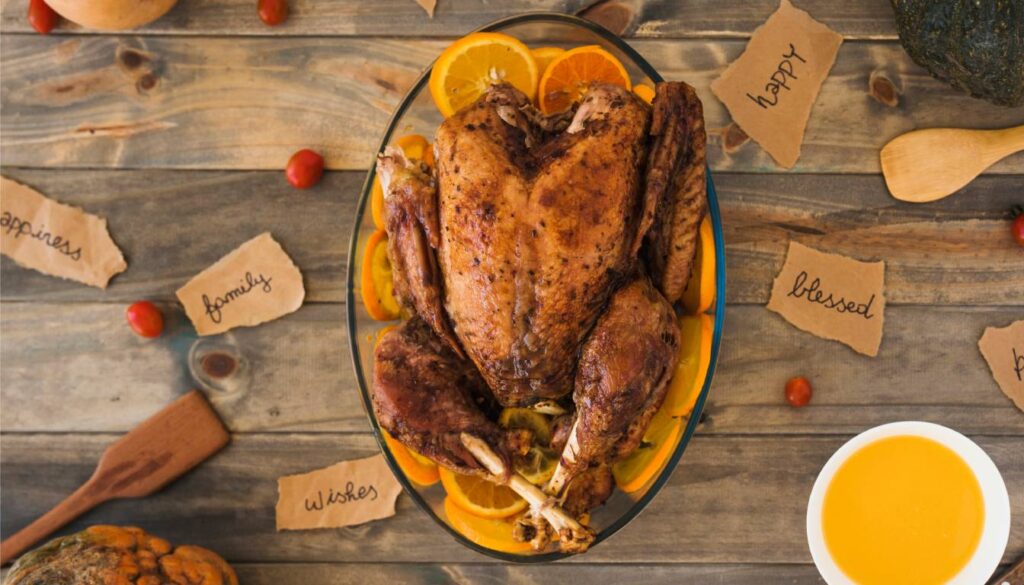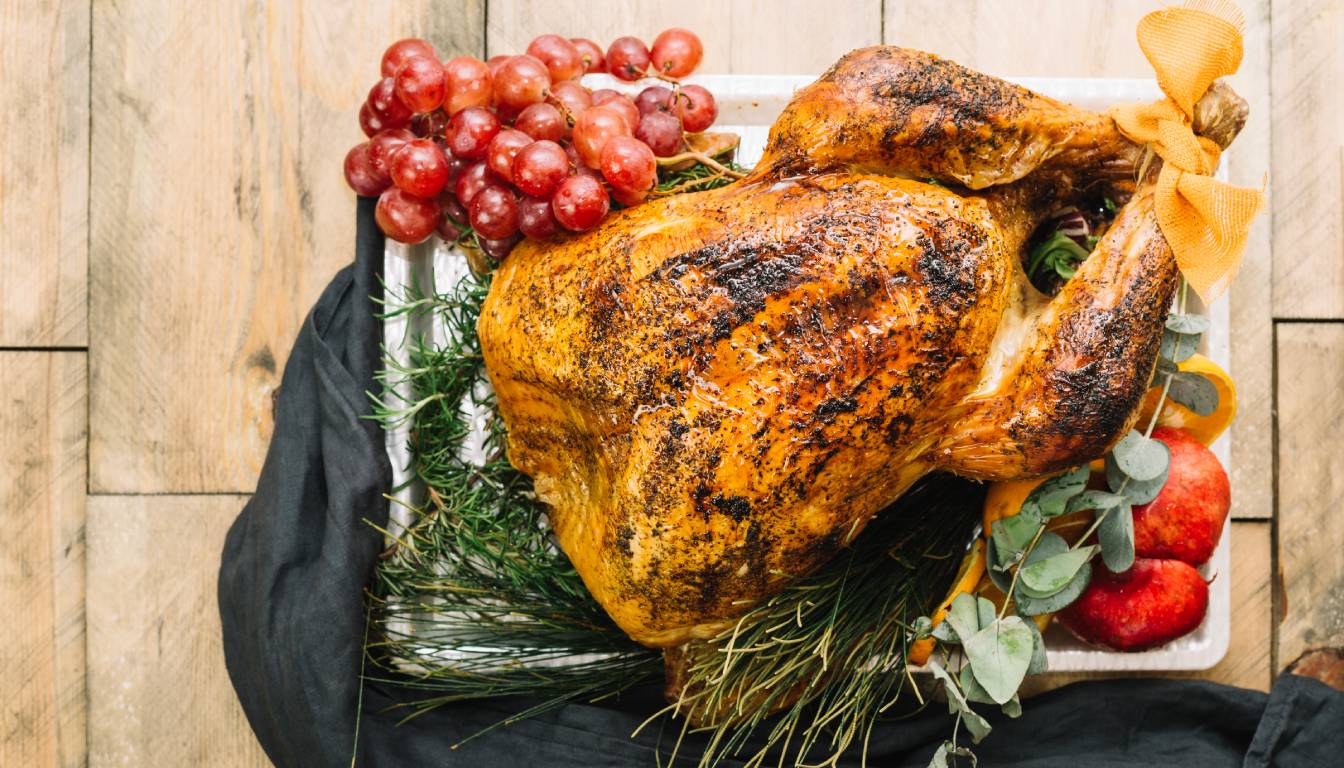With the holiday season approaching, many of us begin to think about the star of the festive meal: the turkey. While there are countless ways to prepare it, one of the most flavorful and aromatic methods is to incorporate herbs. Infusing your turkey with herbs enhances the depth and complexity of its flavor while filling your home with a mouthwatering aroma. In this article, we’ll show you exactly how to create the perfect herb-infused turkey recipe.
Herbs have been used in cooking for centuries, and good reason. They add flavor and aroma to dishes, and can even have health benefits. When it comes to turkey, many different herbs can be used, each with its unique flavor profile. Some popular herbs for turkey include rosemary, thyme, sage, and parsley. These herbs can be used in a variety of ways, from rubbing them on the skin of the turkey to stuffing them inside the cavity. Whether you are preparing a turkey for Thanksgiving, Christmas, or any other holiday meal, using herbs is a great way to take your turkey to the next level.
How to Prepare and Cook a Herb Recipe for Turkey
Preparing a herb-roasted turkey is a great way to add flavor to your holiday meal. Here are some tips for making a delicious herb-roasted turkey.
Thawing and Prepping the Turkey
Before you start cooking, you need to thaw your turkey. The safest way to do this is to thaw it in the refrigerator. A general rule of thumb is to allow 24 hours for every 4-5 pounds of turkey. Once the turkey is thawed, remove the giblets and neck from the cavity and rinse the turkey thoroughly inside and out.
Making the Herb Recipe for Turkey Seasoning
To make the herb-roasted seasoning, mix fresh sage, fresh rosemary, fresh thyme leaves, black pepper, and salt. You can also add garlic powder or other spices to taste. Rub the seasoning mixture all over the turkey, including under the skin and inside the cavity.
Roasting the Turkey at the Right Temperature and Time
Preheat your oven to 325°F. Place the turkey on a rack in a roasting pan and brush with herb butter or olive oil. Tent the turkey with foil and roast for about 15 minutes per pound, or until the internal temperature of the thickest part of the turkey reaches 165°F. Be sure to baste the turkey with butter or broth every 30 minutes to keep it moist.
What Herbs to Use
Sage, thyme, and rosemary are classic herbs for a herb-roasted turkey. You can use either fresh or dried herbs. Fresh herbs will give your turkey a more intense flavor, but dried herbs are more convenient.
Tips for Keeping the Turkey Moist
To keep your turkey moist, tent it with foil for the first hour of roasting. This will help to trap the moisture. You can also baste the turkey with butter or broth every 30 minutes, which will add flavor and moisture. Finally, be sure to let the turkey rest for at least 15-20 minutes before carving. This will allow the juices to be redistributed, resulting in a juicy and delicious turkey.
By following these tips, you can make a delicious herb-roasted turkey that will be the star of your holiday meal.
Other Recipes for Your Holiday Meal
Looking for more recipes to add to your holiday meal? Here are some delicious and easy-to-make options that will complement your herb roasted turkey perfectly.
Prosciutto Wrapped Asparagus
If you’re looking for a quick and easy appetizer that’s sure to impress, try prosciutto-wrapped asparagus. Simply wrap a slice of prosciutto around each asparagus spear and bake in the oven until crispy. This dish is a great way to add some green to your holiday spread.
Turkey Brine Recipe
For a moist and flavorful turkey, try bringing it before roasting. To make a simple turkey brine, combine salt, water, and your favorite herbs and spices. Let the turkey soak in the brine for several hours before roasting in the oven. This will ensure that your turkey is juicy and packed with flavor.
Honey Glazed Ham
If you’re not a fan of turkey, consider serving a honey-glazed ham instead. This sweet and savory dish is a classic holiday favorite. To make the glaze, simply combine honey, brown sugar, and your favorite spices. Brush the glaze over the ham and bake in the oven until golden brown.
Sweet Potato Casserole with Marshmallows
No holiday meal is complete without a sweet potato casserole. This classic dish is made with mashed sweet potatoes, butter, brown sugar, and spices. Top it off with a layer of marshmallows and bake in the oven until golden brown. It’s the perfect side dish to complement your herb-roasted turkey.
Whether you’re looking for sides, brine recipes, or sweet treats, these recipes are sure to be a hit at your holiday meal. With a little bit of preparation and some fresh ingredients, you can create a delicious and memorable feast for your friends and family.
Before You Go – Herb Recipe for Turkey

Using herbs to flavor turkey is a great way to add depth and complexity to the flavor profile of the bird. Whether you choose to use a simple herb butter or a more complex herb blend, the result is sure to be delicious.
One great thing about using herbs to flavor turkey is that it can help to mask any dryness or blandness that may be present in the meat. This is especially useful when dealing with leftovers, as turkey tends to dry out when reheated. By using herbs, you can help to revive the flavor of the meat and make it more enjoyable to eat.
When carving a turkey, it’s important to have a good cutting board and a sharp knife. A large platter is also helpful for presenting the meat to your guests. Additionally, having a flavorful sauce to serve alongside the turkey can help to enhance the overall dining experience.
Overall, using herbs to flavor turkey is a simple and effective way to elevate the taste of this classic holiday dish. Whether you’re a seasoned pro or a first-time cook, incorporating herbs into your turkey recipe is sure to impress your guests and leave them wanting more.
Linking Our Home Page with Herb Recipe for Turkey
Hello, herb enthusiasts! Let’s chat about how our home page at theherbprof.com and our “Herb Recipe for Turkey” section are like two peas in a pod.
Our home page is the heart of our herbal community. It’s where we share our love for herbs, from the latest research to traditional wisdom. It’s a place for us to learn, share, and grow together. You can check our homepage here!
Now, let’s talk about our “Herb Recipe for Turkey” section. This is where we roll up our sleeves and get our hands dirty. We explore the benefits of different herbs, the techniques for extracting their goodness, and the ways to use them for health and well-being.
So, how do these two sections help each other? Well, our home page provides a broad overview of our herbal journey, while the tincture section offers a focused exploration of a specific topic. They’re like two sides of the same coin, each enriching the other.
By linking these two sections, we create a seamless flow of information. Visitors can start on the home page, get a feel for what we’re all about, and then dive into the tincture section for a more detailed study. It’s like having a guided tour of our herbal world!
References – Herb Recipe for Turkey
Little Herb Encyclopedia, by Jack Ritchason; N.D., Woodland Publishing Incorporated, 1995
The Ultimate Healing System, Course Manual, Copyright 1985, Don Lepore
Planetary Herbology, Michael Tierra, C.A., N.D., Lotus Press, 1988
Handbook of Medicinal Herbs, by James A. Duke, Pub. CRP Second Edition 2007
The Complete Medicinal Herbal, by Penelope Ody, Published by Dorling Kindersley
Check the Following Articles!
Herbalist Logo Design: Tips and Examples
Herbal Antibiotics for Infections: Fight Bacteria Now!
Natural Antibiotics Honey: The Power Sugar Substitute
Frequently Asked Questions – Herb Recipe for Turkey
1. What combination of herbs and spices enhances the flavor of a roasted turkey?
When it comes to enhancing the flavor of a roasted turkey, a combination of herbs and spices can be used. Some popular herbs and spices include thyme, rosemary, sage, garlic, onion, salt, and pepper. These herbs and spices can be mixed to create a delicious rub that can be applied to the turkey before roasting. You can also stuff the turkey with fresh herbs and spices to infuse the bird with flavor.
2. How can I create a savory herb butter for a moist and flavorful turkey?
Creating a savory herb butter is easy and can add moisture and flavor to your turkey. Simply mix softened butter with herbs such as thyme, rosemary, sage, and garlic. You can also add lemon zest or other citrus to brighten the flavor. Once the herb butter is mixed, you can spread it under the skin of the turkey or rub it all over the bird before roasting.
3. What is a simple yet delicious herb seasoning recipe for turkey?
A simple yet delicious herb seasoning recipe for turkey can be made by combining salt, pepper, garlic powder, onion powder, thyme, and rosemary. Mix the herbs and spices and rub them all over the turkey before roasting. This seasoning blend is versatile and can be adjusted to suit your taste.
4. How should fresh herbs be used when preparing a turkey?
Fresh herbs can add a lot of flavor to a turkey. You can use them to create a rub or stuffing for the bird. To use fresh herbs, chop them finely and mix them with butter or oil. You can then spread the mixture under the skin of the turkey or rub it all over the bird before roasting. Fresh herbs can also be used to create a flavorful stuffing for the turkey.
5. What are Gordon Ramsay’s recommendations for seasoning a turkey?
Gordon Ramsay recommends seasoning a turkey with a mixture of butter, lemon, thyme, and garlic. He suggests rubbing the mixture under the skin of the turkey and also stuffing the bird with fresh herbs and lemon. Ramsay also recommends basting the turkey with the pan juices during roasting to keep it moist.
6. Is it better to rub butter or oil on a turkey before roasting it for optimal taste and texture?
Both butter and oil can be used to rub on a turkey before roasting, but butter is often preferred for its flavor and ability to create a crispy skin. However, if you are watching your fat intake, you can use oil instead. Regardless of which one you use, be sure to rub it all over the turkey before roasting to ensure that the bird stays moist and flavorful.
